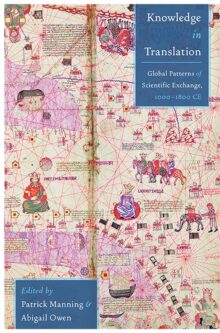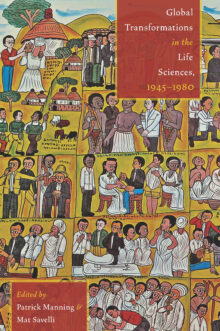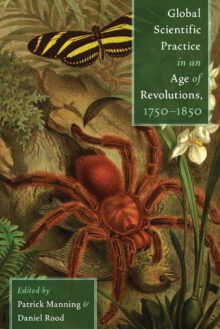
Patrick Manning
Patrick Manning is Andrew W. Mellon Professor Emeritus of World History at the University of Pittsburgh and founding director of the World History Center there. He is the author or coeditor of numerous books, including Global Scientific Practice in an Age of Revolutions, 1750–1850.
Knowledge in Translation
Global Patterns of Scientific Exchange, 1000-1800 CE
In the second millennium CE, long before English became the language of science in the twentieth century, the act of translation was crucial for understanding and disseminating knowledge and information across linguistic and geographic boundaries. This volume considers the complexities of knowledge exchange through the practice of translation over the course of a millennium, across fields of knowledge—cartography, health and medicine, material construction, astronomy—and a wide geographical range, from Eurasia to Africa and the Americas. Contributors literate in Arabic, Catalan, Chinese, Greek, Hebrew, Italian, Japanese, Latin, Minnan, Ottoman, and Persian explore the history of science in the context of world and global history, investigating global patterns and implications in a multilingual and increasingly interconnected world. Chapters reveal cosmopolitan networks of shared practice and knowledge about the natural world from 1000 to 1800 CE, emphasizing both evolving scientific exchange and the emergence of innovative science. By unraveling the role of translation in cross-cultural communication, Knowledge in Translation highlights key moments of transmission, insight, and critical interpretation across linguistic and faith communities.
Global Transformations in the Life Sciences, 1945–1980
The second half of the twentieth century brought extraordinary transformations in knowledge and practice of the life sciences. In an era of decolonization, mass social welfare policies, and the formation of new international institutions such as UNESCO and the WHO, monumental advances were made in both theoretical and practical applications of the life sciences, including the discovery of life’s molecular processes and substantive improvements in global public health and medicine. Combining perspectives from the history of science and world history, this volume examines the impact of major world-historical processes of the postwar period on the evolution of the life sciences. Contributors consider the long-term evolution of scientific practice, research, and innovation across a range of fields and subfields in the life sciences, and in the context of Cold War anxieties and ambitions. Together, they examine how the formation of international organizations and global research programs allowed for transnational exchange and cooperation, but in a period rife with competition and nationalist interests, which influenced dramatic changes in the field as the postcolonial world order unfolded.
Global Scientific Practice in an Age of Revolutions, 1750-1850
The century from 1750 to 1850 was a period of dramatic transformations in world history, fostering several types of revolutionary change beyond the political landscape. Independence movements in Europe, the Americas, and other parts of the world were catalysts for radical economic, social, and cultural reform. And it was during this age of revolutions—an era of rapidly expanding scientific investigation—that profound changes in scientific knowledge and practice also took place.
In this volume, an esteemed group of international historians examines key elements of science in societies across Spanish America, Europe, West Africa, India, and Asia as they overlapped each other increasingly. Chapters focus on the range of participants in eighteenth- and nineteenth-century science, their concentrated effort in description and taxonomy, and advances in techniques for sharing knowledge. Together, contributors highlight the role of scientific change and development in tightening global and imperial connections, encouraging a deeper conversation among historians of science and world historians and shedding new light on a pivotal moment in history for both fields.



